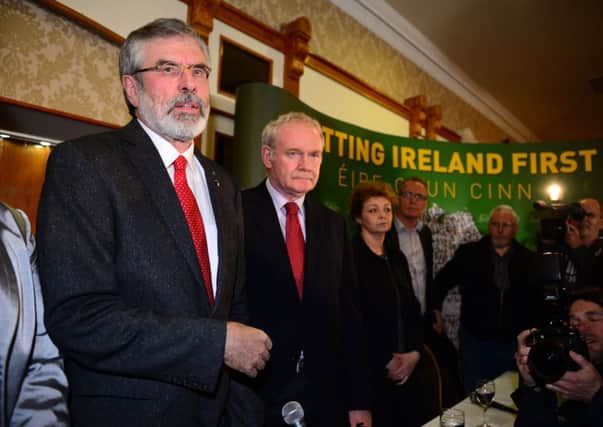Voices from Northern Ireland’s past still resonating


Mr Adams emerged from Antrim police station yesterday afternoon with his reputation as the man who silenced the IRA guns largely intact. A file has been sent to the Public Prosecution Service, but media are reporting that formal charges against the Sinn Fein president are “very unlikely”.
The question that will be raised, after a week that brought Northern Ireland to the brink of yet another crisis, is why Mr Adams was taken into custody.
Advertisement
Hide AdAdvertisement
Hide AdHis arrest was the result when the PSNI decided to subpoena Boston College in the US for tapes of interviews conducted with former republicans as part of an oral history project about the Troubles. These interviews are widely thought to contain accusations from senior IRA figures that Mr Adams directed the killing of Jean McConville, the West Belfast mother of ten who was “disappeared” in 1972. Her remains were discovered on a Co Louth beach in 2003.
This case is emblematic of Northern Ireland’s unresolved past. Although the Good Friday Agreement in 1998 allowed for the release of former paramilitaries, crimes committed during the 30-year conflict are still subject to criminal proceedings. With unionists and nationalists unable to agree on a common approach to dealing with “the past” – as demonstrated by the failure of the Richard Haass talks in the New Year – the task of truth recovery is left to the police. But it is difficult to imagine the PSNI’s decision to pursue the Boston College recordings was not given the green light by the British government. This, after all, was a case that could potentially bring down Stormont, as the accusations and counter accusations fired at one another by Martin McGuinness and Peter Robinson at the weekend attest.
The current Tory administration is deeply ambivalent about Northern Ireland. The peace process was very much a New Labour project, replete with “hand of history” hyperbole and feel-good photo ops.
Prime Minister David Cameron and his secretary of state Theresa Villiers are from a Conservative generation that grew up with the Brighton bomb and the Hunger Strikes. Northern Ireland, for them, is “a place apart”. Would any other part of Britain descend into street protests and blockades, as Belfast did over the Union flag in December 2012, and not receive an emergency visit from the Prime Minister? There are many on the Tory benches, too, who feel that republicans have been too richly rewarded by the peace, gains which a successful conviction of Mr Adams would surely jeopardise.
Now, Northern Ireland must enter an already bad-tempered election season with both wings of the power-sharing government in open, vituperative opposition. Mr Adams might have been released, the past is likely to continue to haunt Northern Ireland.